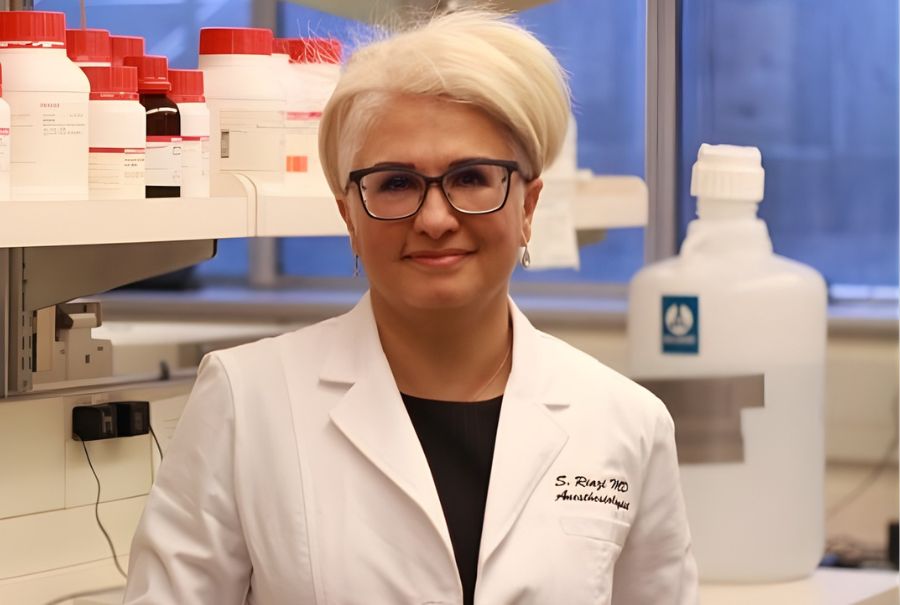Tammy Simon, a lawyer with UHN Legal Affairs, captures her first day of redeployment to Toronto General Hospital’s 5B Cardiology inpatient unit. “It’s humbling to see how hard everyone is working.” (Photo: Tammy Simon)
“I just figured that if they were asking non-clinical staff to volunteer, then they must really need the help.”
This simple realization was what motivated Tamar (Tammy) Simon to step forward and volunteer to be redeployed to Toronto General Hospital’s 5B Cardiology inpatient unit. A lawyer providing legal counsel with UHN Legal Affairs, Tammy had no clinical experience and had never worked in an inpatient area before, but she wanted to do whatever she could to help.
The latest and most intense wave of the pandemic has brought yet another challenge to hospitals across the country: significant staffing shortages as healthcare workers become ill with COVID-19, or must isolate due to a high-risk exposure.
By mid-January, the number of clinical staff off work due to illness or exposure surpassed 1,000, requiring UHN and other healthcare institutions to find creative ways to continue to deliver patient care safely.
“In previous waves, redeployment was primarily focused on moving our clinical staff to areas most in need; for instance as surgery ramped down, operating room nurses could be redeployed to intensive care units (ICUs) as extenders,” says Dharsha Quintero, Director, People and Culture and one of the leads for UHN’s redeployment operations. “But this time around, the reduction in surgical volume did not yield any surplus clinical staff to redeploy, due to COVID-related absences within TeamUHN.
“Every wave has required us to be nimble and alter our pandemic response.”
The idea to consider asking non-clinical staff to volunteer for redeployment to clinical areas is a first for UHN, and came up during leadership meetings over the holidays. The COVID-19 Omicron variant had begun to rapidly accelerate case numbers in every community, staffing numbers were already starting to look precarious, and there was concern there would be a significant impact to care delivery without a contingency plan.
“We had not redeployed non-clinical staff to clinical areas before; we had to be thoughtful about our approach and wanted our staff to have a positive redeployment experience,” Dharsha explains.
“We were overwhelmed with gratitude at the number of individuals who volunteered to be trained for this newly created role of hospital support aide (HSA). In this role, staff would not be expected to provide any direct patient care, but would receive appropriate training to attend to care tasks – such as answering call bells, changing linens, and supporting virtual calls with patient family – that could alleviate some pressure from the inpatient areas short on clinical staff.”
About 700 staff identified for redeployment
Helping to somehow alleviate the pressure on clinical teams was what motivated Nerysa Devon, a client service’s representative at Altum Health’s WSIB Specialty Clinic, to volunteer for redeployment.
“Working at UHN, I’m aware of all the challenges that our clinical colleagues have been experiencing for the last two years,” Nerysa says. “This was a chance for me to help out in any way I could, and I thought it would be definitely be a different experience.”
By early January, UHN’s Redeployment Centre (RDC) had a total of 700 staff, both clinical and non-clinical identified for redeployment. The planning proved critical – as numbers of staff having to isolate due to illness or exposure rose to the hundreds in the first weeks of 2022, the RDC activated to enact redeployment.
In addition to the volunteer HSAs, more than 60 UHN Research staff were trained and redeployed as HSAs and personal protective equipment (PPE) coaches to support the technical areas.
After completing the required online modules, in-hospital training to learn how to properly don and doff personal protective equipment (PPE), and being fit-test for an N95 respirator, both Tammy and Nerysa started their respective redeployment assignments on Jan. 14.
For Tammy’s first shift, she was buddied with another colleague who volunteered to redeploy, and shadowed the unit’s patient care assistant (PCA) to get a sense of their tasks and “observe how hard they work.” After that initial orientation, Tammy got to work expediting tasks that could take longer if a patient had to wait for someone to be available.
The experience has been many things: eye-opening, rewarding, tiring, but not without its challenges or some feelings of helplessness.
“It’s humbling to see how hard everyone is working,” Tammy says. “You see a lot of physicians on TV talking about the challenges on the units, but when you’re actually on the unit yourself you really see and understand all the people involved to help care for patients – the nurses, Environmental Services staff, PCAs, everyone.”
“The staff following the COVID protocols also eats up a lot of time,” Tammy says. All the cleaning and donning and doffing of PPE, it’s necessary of course, but takes away from time spent with a patient.
“The part I enjoy most is talking to the patients, like when I’ve been tasked as a constant observer. I feel like I’m helping to alleviate the loneliness and hopefully that offers some comfort.”
Though it was a little stressful to be working in such a foreign environment, the unit’s welcoming reception helped overcome any anxiety about fitting in.
“The staff on the unit have been very appreciative and patiently describe how to do everything,” Tammy recounts. “They have been very welcoming and are a fun bunch to work with.”
‘Working on a unit is very different than sitting at a desk’
Nerysa, who was redeployed to Toronto Western Hospital’s 5A Fell inpatient unit the day after her training, was a little nervous on her first shift where she dove right in to her duties.
“I wasn’t really sure what to expect, and I was going to work on a unit that was on outbreak which really underlines how important all the PPE and protocols are for safety – that was really eye-opening,” she says. “It was a lot to take in, but the PCAs were great and showed me everything I could do to help.”
“I was very tired that first day,” she continues. “Working on a unit is very different than sitting at a desk.”
Like Tammy, being able to help patients has been a highlight of her redeployment experience, but so has getting to know the unit staff and the appreciation they show her for the help she provides.
“I don’t always feel like I’m helping because there are some things I can’t do,” Nerysa says. “But the unit staff have been so appreciative of my help so I know I’m making a small difference, and I go home with a good feeling.”
Tammy and Nerysa each volunteered for four-week redeployment assignments. Tammy, who had to juggle her redeployment along with her regular duties will soon return to her role at UHN, while Nerysa has just agreed to redeploy for an extra two weeks on 5A.
For both, the experience has been a memorable one.
“This experience has been really humbling and rewarding,” Nerysa says. “You really don’t know the severity of this situation until you’re in it. I’m glad to have volunteered, people should try to do it if they can.
“It’s a good way to see what frontline staff have been dealing with these past two years, I have a new appreciation and respect for what our clinical staff do.”


